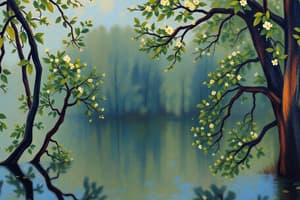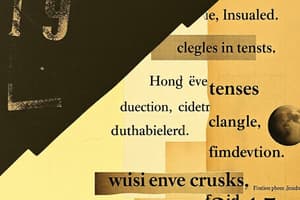Podcast
Questions and Answers
Identify the sentence that uses the past continuous tense.
Identify the sentence that uses the past continuous tense.
- He has been working here for five years.
- She finished her homework last night.
- I was eating dinner when the phone rang. (correct)
- They will visit Paris next summer.
Which of the following sentences correctly uses the present perfect form?
Which of the following sentences correctly uses the present perfect form?
- They are studying for the exam.
- He has completed the project. (correct)
- She walks to the park every day.
- I will go to the store tomorrow.
Which of the following sentences is written in simple future tense?
Which of the following sentences is written in simple future tense?
- She has traveled to Japan.
- He was driving to work when it started to rain.
- They will be playing soccer at 5 PM.
- I will finish the report by Monday. (correct)
Select the correct structure for the present continuous tense.
Select the correct structure for the present continuous tense.
Which option exemplifies the present perfect continuous tense?
Which option exemplifies the present perfect continuous tense?
What is the correct structure of the past perfect tense?
What is the correct structure of the past perfect tense?
Which of the following sentences demonstrates the future perfect tense?
Which of the following sentences demonstrates the future perfect tense?
Which sentence illustrates the past perfect continuous tense?
Which sentence illustrates the past perfect continuous tense?
Flashcards are hidden until you start studying
Study Notes
Present Tense
- Definition: Indicates actions or states occurring currently.
- Forms:
- Simple Present:
- Structure: Subject + base form of the verb (+s/es for third person singular).
- Example: She walks to school.
- Present Continuous:
- Structure: Subject + am/is/are + verb + ing.
- Example: They are studying now.
- Present Perfect:
- Structure: Subject + has/have + past participle.
- Example: He has finished his homework.
- Present Perfect Continuous:
- Structure: Subject + has/have been + verb + ing.
- Example: We have been waiting for two hours.
- Simple Present:
Past Tense
- Definition: Indicates actions or states that occurred before the present moment.
- Forms:
- Simple Past:
- Structure: Subject + past form of the verb.
- Example: She walked to school.
- Past Continuous:
- Structure: Subject + was/were + verb + ing.
- Example: They were studying when I called.
- Past Perfect:
- Structure: Subject + had + past participle.
- Example: He had finished his homework before dinner.
- Past Perfect Continuous:
- Structure: Subject + had been + verb + ing.
- Example: We had been waiting for an hour when he arrived.
- Simple Past:
Future Tense
- Definition: Indicates actions or states that will occur after the present moment.
- Forms:
- Simple Future:
- Structure: Subject + will + base form of the verb.
- Example: She will walk to school.
- Future Continuous:
- Structure: Subject + will be + verb + ing.
- Example: They will be studying at 6 PM.
- Future Perfect:
- Structure: Subject + will have + past participle.
- Example: He will have finished his homework by then.
- Future Perfect Continuous:
- Structure: Subject + will have been + verb + ing.
- Example: We will have been waiting for two hours by the time you arrive.
- Simple Future:
Present Tense
- Indicates ongoing actions or states in the present time.
- Simple Present:
- Formed as Subject + base verb (+s/es for third person).
- Example: "She walks to school."
- Present Continuous:
- Formed as Subject + am/is/are + verb + ing.
- Example: "They are studying now."
- Present Perfect:
- Formed as Subject + has/have + past participle.
- Example: "He has finished his homework."
- Present Perfect Continuous:
- Formed as Subject + has/have been + verb + ing.
- Example: "We have been waiting for two hours."
Past Tense
- Represents actions or states that took place before the present moment.
- Simple Past:
- Formed as Subject + past form of the verb.
- Example: "She walked to school."
- Past Continuous:
- Formed as Subject + was/were + verb + ing.
- Example: "They were studying when I called."
- Past Perfect:
- Formed as Subject + had + past participle.
- Example: "He had finished his homework before dinner."
- Past Perfect Continuous:
- Formed as Subject + had been + verb + ing.
- Example: "We had been waiting for an hour when he arrived."
Future Tense
- Denotes actions or states that will occur after the present moment.
- Simple Future:
- Formed as Subject + will + base form of the verb.
- Example: "She will walk to school."
- Future Continuous:
- Formed as Subject + will be + verb + ing.
- Example: "They will be studying at 6 PM."
- Future Perfect:
- Formed as Subject + will have + past participle.
- Example: "He will have finished his homework by then."
- Future Perfect Continuous:
- Formed as Subject + will have been + verb + ing.
- Example: "We will have been waiting for two hours by the time you arrive."
Studying That Suits You
Use AI to generate personalized quizzes and flashcards to suit your learning preferences.




